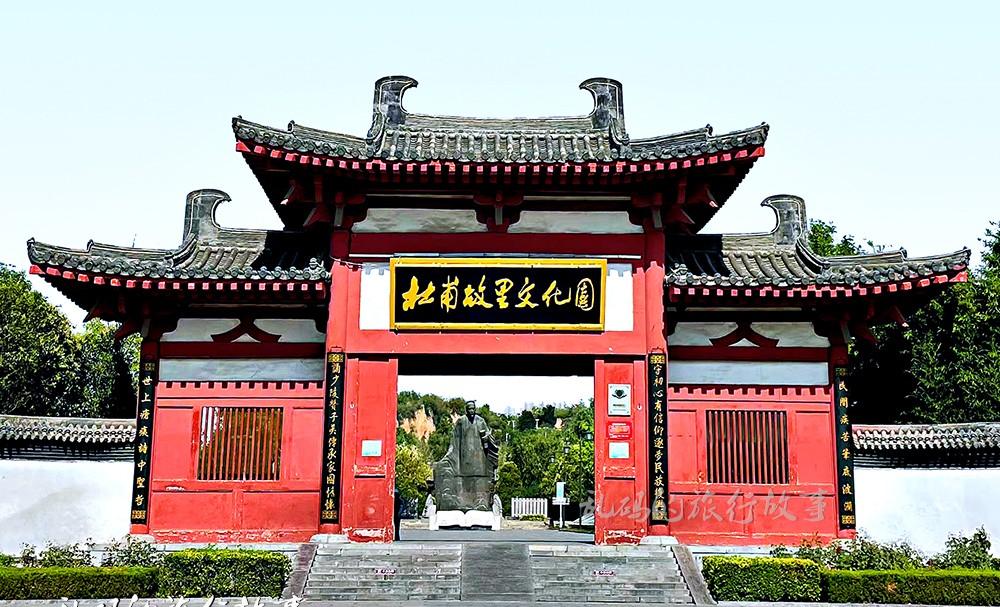Henan Gongyi, is one of the birthplaces of Chinese civilization, as early as the Qinzhuang Xiangwang period, it was named after "mountains and rivers four plugs, consolidation and not pulling", and because of the ancient capital Luoyang, known as the "Key to the Eastern Capital". In addition, Gongyi is also the hometown of the poet Saint Du Fu, where there are two attractions related to Du Fu, one is Du Fu's mausoleum, and the other is Du Fu's birthplace and growth place - Du Fu's hometown scenic spot.

Du Fu's hometown is located in Nanyaowan Village, Zhanjie Town, Gongyi City. According to records, Du Fu's great-grandfather Du Yiyi was originally from Xiangyang, Hubei Province, and when he was serving as a county commander in Gong County, he moved his family here. 1309 years ago, China's great realist poet Du Fu (712-770) was born in Nanyaowan Village, and spent his boyhood here, and still circulates the story of Du Fu's "Kangshui Caiwen" when he was a teenager in Gongyi.
In 2007, in accordance with the national 4a-level tourist scenic spot standard, the local government invested 150 million yuan to build Du Fu's hometown into an antique and pleasing garden-style cultural tourism scenic spot. The whole scenic spot looks east to zhengzhou, the ancient capital of Luoyang in the west, zhongyue Song mountain in the south, and the Yellow River in the north, with Beacon Mountain and Du Fu's birth kiln as the core landscape, covering an area of 372 acres.
Du Fu, as a great composer of China's poetry circles that inherits the past and the future, has created more than 3,000 poems in his lifetime, and more than 1,400 have been handed down to the present, and has been praised as "poetry saint" by later generations. His poems are full of feelings of worrying about the country and the people, and they are not only respected and loved by people at home, but also respected by people all over the world. At the 1962 World Peace Council Congress, Du Fu was listed as one of the world's cultural celebrities.
Heluo water and soil cultivated Du Fu's noble character, although his time in his hometown was not long, but he always missed his hometown in his life, leaving behind to posterity such famous Huaixiang poems as "Dew is white from tonight, the moon is the hometown of Ming", "Autumn wind is cold, night snow Gong Meichun", "The flower path has not been swept by guests, Pengmen is now open for Junkai" and other famous Nostalgia poems, becoming the precious spiritual wealth of the people of Gongyi.
Cave dwellings are an ancient form of habitation on the Loess Plateau in northern China, which has been used since the Neolithic Age. Because Gongyi is located in the loess hilly area, digging caves to settle has become the main way of living for local ancestors. Different from the loess plateau cave dwellings, the ancient dwellings in Gongyi usually adopt the combination of cave dwellings and houses, with the cave dwellings as the main building, and then build the matching houses in front of the kilns to form a unique northern dwelling.
In the first year of Tang Taiji (712 AD), the poet Saint Du Fu was born in a cave under the Beacon Mountain, which was therefore named "Du Fu Birth Kiln". The existing cave is 4.6 meters high, 2.9 meters wide and 20 meters deep, the first 7 meters of the cave are brick walls of the Ming Dynasty, and the last 13 meters are rebuilt by posterity in accordance with the construction methods of the Ming Dynasty, and in the middle of the cave stands a statue of Du Fu.
In the fifth year of Qing Yongzheng (1727), after Yin Zhanghan of Henan Province rebuilt the "Du Fu Birth Kiln", a "Monument to the Hometown of Shi sheng" was erected in the cave. It is worth mentioning that among the ancient Chinese celebrities, this is the only case where their hometown can be identified and preserved. What is even more amazing is that the beacon mountain behind the cave, although it is not high and the trees are not dense, is shaped like a pen holder, which just alludes to the ancient Chinese traditional folk custom "there is a pen holder next to the house, and there will be readers".
Nowadays, Du Fu's hometown scenic spot has become a holy place for the world to learn to carry forward the spirit of poetry and carry forward the national culture, if you have the opportunity, you may wish to come here and walk around. Scenic address: Nanyaowan Village, Station Street Town, Gongyi City, Henan Province, Transportation: Take bus No. 12 at Gongyi Bus Station or Railway Station to Du Fu's Hometown Station and get off directly to the scenic spot.